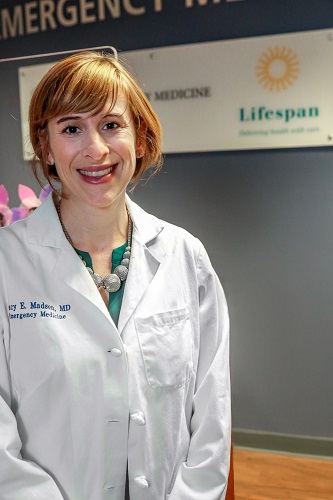Dr. Tracy Madsen, an emergency room physician at Rhode Island Hospital and The Miriam Hospital, has been selected by the National Academy of Medicine as an American Board of Emergency Medicine fellow in the academy’s 2021 fellowships.
Madsen is one of just five doctors across the country chosen for the two-year fellowship. She is also co-director of the Comprehensive Stroke Center at Rhode Island Hospital and the Primary Stroke Center at The Miriam Hospital, and the associate director of the Sex and Gender in Emergency Medicine Program at Rhode Island Hospital.
PBN: What are you looking forward to most about being a part of the 2021 NAM fellowship?
MADSEN: The National Academy of Medicine fellowship for health science scholars provides an opportunity for researchers and clinicians to delve into public policy and contribute to the future of health care.
I was selected to participate in NAM’s American Board of Emergency Medicine Emergency Medicine Fellowship, which is focused on health equity in emergency care. I am excited to learn how health policies are developed and use this knowledge to translate my research findings into practical change in health systems and settings.
Over the past several years, I have been working to advance knowledge of sex and gender differences in health and disease with a focus on acute stroke and cerebrovascular disease. I’m looking forward to meeting national leaders who shape policy decisions that impact health care delivery and population health outcomes.
PBN: Please explain a little bit about the fellowship project you intend to work on.
MADSEN: The NAM American Board of Emergency Medicine fellowship is a two-year opportunity where I will research health equity in emergency medicine and the treatment of acute cerebrovascular disease and other forms of cardiovascular disease.
I plan to investigate practical solutions to the health care disparities faced by the patients I take care of in our emergency departments here in Providence, whether related to race or gender, or to a lack of knowledge of the impact of biologic sex on disease. The challenges experienced by the patients I care for in the emergency department inform critical research questions and health equity issues that need to be addressed.
PBN: How will you balance your work as an emergency medicine physician with your involvement in the fellowship?
MADSEN: Lifespan [Corp.] and Brown Emergency Medicine are very supportive of this fellowship. I will still practice emergency medicine during the two-year fellowship period, but on a slightly reduced schedule so that I can dedicate 10% to 20% of my time to NAM board seminars and related studies, and meeting with NAM mentors.
PBN: In addition to co-directing the stroke centers at Rhode Island and The Miriam hospitals, you are also the associate director of the sex and gender in emergency medicine division at Rhode Island Hospital. What issues does the sex and gender division oversee?
MADSEN: The Division of Sex and Gender in Brown Emergency Medicine’s department of emergency medicine conducts research on sex and gender differences in health and disease and works to promote equity in health care access and delivery, particularly among populations with known disparities such as women, women of color and individuals who identify as lesbian, gay, bisexual, transgender, queer, intersex, and/or asexual.
PBN: Where do you hope to take your research after the fellowship is completed?
MADSEN: I hope to focus on the prevention and treatment of cerebrovascular disease and strategies for promoting brain health using a personalized medicine approach that incorporates the role of sex, gender, and other biologic and demographic factors. The goals will be to reduce health disparities faced by Black, brown, transgender individuals and women to raise the quality of care provided in emergency departments and other health care facilities and to improve population health overall.
Elizabeth Graham is a PBN contributing writer.













